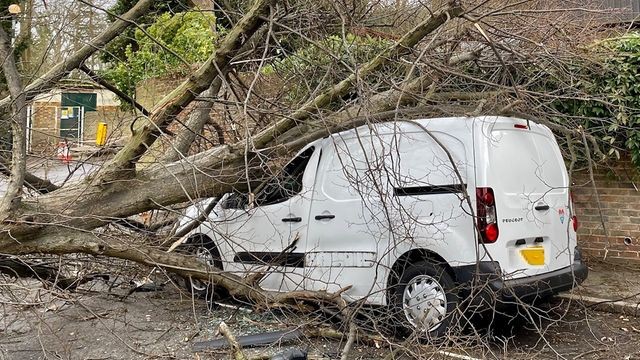What Did We Learn From Eunice?
Eunice was one of the most ferocious storms in England in 20 years. It wreaked havoc across a large swath of the country, replicating what had happened in Scotland with storm Arwen a few months before. Both storms killed and both storms brought widespread power outages.

Scientists tell us that although we should not expect more storms, we should expect the storms we do have to be more powerful and more impactful. This is due to the increase in energy and the amount of water they carry as a result of climate change.
My own power went out at 11am on Friday 18th.
I was in the middle of a Zoom call, like millions of others, I am sure. My laptop did not like it however, and although the battery was fully charged it shut down for a few seconds, dropping me off the call.
When it came back to life it had lost the correct date which took time to fix.
The broadband had also gone with the power and so I had to tether to my phone. This is something that I had done a thousand times when my remit was Europe, Middle East and Africa and on the road, but when it mattered it would not work. It took a good few minutes of trying before I managed to get connected.
Then a couple of minutes more to get back on the call. Fifteen minutes in total.
I am pretty technical and others may have had even more trouble. My call was also an internal call on a non-urgent operational matter and so 15 minutes was not too critical.
Had my work been critical or my activity time focused things would have been very different.
A further surprise awaited me. Teams eats battery life! My top of the range laptop with a supposed battery life of a day ran down in 2 hours.
So, by 1pm I would have been stuck but for the fact I had a fully charged Reskube to hand. I was kicking myself for not setting it up. If I had, I would not have noticed a thing as the power and broadband failed, but I could have carried on regardless.
I had just brought it back from a customer demo the day before and it sat beside my desk instead of under it. That won’t happen again!
So, I plugged my laptop and screen in to the Reskube and carried on working for the rest of the day without problem despite the lack of mains power.
I do know that my neighbours were not so lucky, and that they had to stop working when their laptops gave in so wasting a critical afternoon as they worked to an important deadline. A high value individual leading a team unable to work.
Our local businesses were also affected. The pubs and shops lost significant business as it was unable to take cards as its point of sale was without electricity. Nobody carries cash these days of course.
Our local supermarket had to throw away close to £1M of stock as the refrigerators and freezers were left without power for over 5 hours.
As I write, on the Sunday evening two and a half days later, our neighbourhood is still in darkness. We may not have power tomorrow morning when we will be expected to be at work.
We could try to get into the office but trains are also disrupted. A dilemma.
Unfortunately, with increasingly powerful storms and the threat of war in Europe resulting in shortages of gas and oil there is a greater risk of power cuts in the near future.
We need to plan for this.
So, what have we learned from Eunice?
1. Laptop batteries do not work like UPSs.
2. Tethering a laptop to a phone does not work every time and often not when you most need it. It cannot be relied on in critical situations, particularly if staff are not technical.
3. Ultimately, what we have learned is that if we or our staff are doing high value or business critical work at home we must think about the infrastructure our businesses provide so we remain in control and able to do our best work uninterrupted.
© 2025 Reskube LTD. ALL RIGHTS RESERVED.
